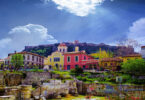In the cold of winter, Greece blossoms into a world of vibrant customs and celebrations that define its unique Christmas experience. Rooted in rich history and folklore, these traditions represent the spirit of togetherness and festivity that marks this joyful season!
Greek Christmas Traditions
In the Greek calendar, Christmas holds a very important place as one of the most loved holidays. The celebrations extend over twelve bright days, culminating in the Epiphany on January 6th, making it a cherished period for the Greek people. Greeks from all corners unite in festivities, embracing outdoor gatherings, indulging in delicious feasts and markets, decorating their surroundings with Christmas symbols, and upholding cherished local traditions. Greece’s Christmas traditions go back centuries, blending ancient practices with more modern twists. These customs resonate deeply with cultural significance and carry wonder filled stories:
- -Christmas Trees: Contrary to the Orthodox tradition, Greece’s link with Christmas trees is relatively recent. Introduced by King Otto in 1834, the trend only popularity post-World War II. Initially decorated with useful items, today, these trees glitter with festive objects, appearing in Greek homes by early December.
- -The Christmas Boat: Before trees took center stage, wooden boats symbolized Christmas in Greece. Reflecting the nation’s maritime heritage and the symbolic journey of life after Christ’s birth, these boats remain a nostalgic choice for some, especially on the islands.
- -Kalanda ‘’Christmas Carols’’: On Christmas Eve, Greek children serenade neighborhoods with Kalanda, traditional carols. This age-old custom sees children traversing houses, singing joyous tunes, and receiving tokens of appreciation.
- -Saint Basil ‘’ Greek Santa Claus’’: Different from Santa Claus, Greece celebrates Saint Basil. He delivers gifts on New Year’s Eve, aligning with his compassionate character.
- Epiphany Celebrations: On January 6th, the Epiphany is widely celebrated across the nation, particularly in coastal areas. During this event, priests throw crosses into the sea, sparking an enthusiastic dive between locals. The person who retrieves the cross is honored for bringing blessings for the New Year.
- Delightful desserts: Melomakarona, honey-soaked cookies, and Kourabiedes, almond-laden delights, grace every household. The famed Vasilopita, a New Year’s cake harboring a lucky coin, embodies a hopeful year ahead.
Greek New Year Customs
The transition to the New Year in Greece unfolds a unique blend of customs that imbue the season with charm and intrigue.
- Card Playing: The dawn of the New Year sees children caroling through the streets, accompanied by card-playing marathons that stretch through the evening.
- -Pomegranate Smashing: An ancient symbol of prosperity, smashing a pomegranate at midnight ushers in luck, health, and prosperity for the coming year.
- Good luck customs: on New Year’s Day all water jugs in the house are emptied and refilled with “Saint Vassili’s” water” or “Saint Basil’s water” and mossy pebbles are gathered from nearby ponds or beaches and left outside the main door of each home.
As the twelve days lead up to Epiphany, a tapestry of traditions and tales reaches a beautiful finale, leaving behind treasured memories and the hope for a year filled with luck, health, and happiness. The vibrant mix of Greek Christmas and New Year customs creates a lively portrayal of community, culture, and the enduring joy that defines Greece’s holiday season. “Xronia Polla, Happy New Year,” resonates throughout the country, capturing the kindness and positivity that characterize this enchanting period.
Estia Developments is a prime Real Estate Developer that creates properties of the highest quality matching every lifestyle for families and individuals in pursuit of their dream home in Greece!
INVEST IN GREECE & OWN YOUR FOREVER HOME Learn more about our projects on ESTIADEVELOPMENTS.COM or contact our experts: +30 2114112112







